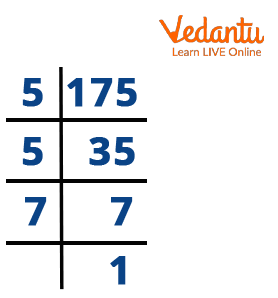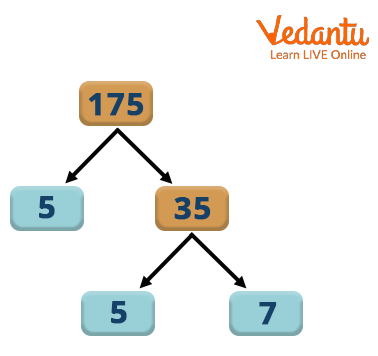




How to Find and Use the Factors of 175 in Maths
A factor is a number that completely divides the original number. Real numbers that can evenly divide the original number are factors of $175$. There is no residue if $"x"$ is the factor of $175$, since $"x"$ divides $175$ into equal parts. For instance, $24$ divided by $4$ is $6$, then 4 is the component of $24$. Consequently, $4$ divides $24$ into six equal parts, leaving $0$ as the remainder. Since $175$ can only be divided by $1, 5, 7, 25, 35 and 175$. So these are factors of 175.
Let's use straightforward methods in this article to determine the factors, pair factors, and prime factors of $175$.
What are the Factors of $175$?
The natural numbers that can divide the number $175$ evenly are factors of $175$. These factors divide the original number into equal numbers of parts. For example, $175$ is divisible by $5$. So, $175$ divided by $5$ is equal to $35$. Hence, $5$ divides the number $175$ into $35$ equal parts.
We can determine the other factors of $175$ with the help of the division method. $175$ has more than two factors. Thus, it is a composite number.
How to Find Factors of $175$?
The natural numbers that can divide the number $175$ evenly are factors of $175$. So the way you find and list all of the factors of $175$ is to go through every number up to and including $175$ and check which numbers result in an even quotient.
In the division method, the factors of $175$ are found by dividing the number $175$ by different integer numbers. If the integer divides $175$ exactly without leaving a remainder, then the integer is a factor of $175$. Let's start dividing $175$ by $1$ and proceed with the different integers.
$175 \div 1 = 175$
$175 \div 2 = 87.5$ So, 2 is not a factor of 175.
$175 \div 5 = 35$
$175 \div 7 = 25$
$175 \div 25 = 7$
$175 \div 35 = 5$
$175 \div 175 = 1$
Therefore, the factors of $175$ are 1, 5, 7, 25, 35 and 175.
Prime Factorisation of $175$
Prime factorization is the process of finding the prime terms or prime factors which, when multiplied, give the original number.

Prime Factorization of 175
Take a pair factor of $175$, say $\left ( 1, 175 \right )$
As the number $1$ is neither prime nor composite, it cannot be split further. Take the other factor, $175$, which is a composite number, and it can be factored further into its prime factors.
Thus, $175$ is written as the product of $7$ and $25$. Here, $7$ is a prime number, $25$ is a composite number, and the number $25$ can be written as the product of $5 and $5.
Write the number $175$ as the product of its prime factors.
So, $175$ is written as $5 \times 5 \times 7$.
Therefore, the prime factorization of $175$ is $5 \times 5 \times 7$ or $5^2 \times 7$, where $5$ and $7$ are prime numbers.

Factor Tree
Pair Factors of $175$
A factor pair is a pair of numbers that, when multiplied, will result in an original number(or the same product).
To calculate the factor of a number, factors are frequently presented as pairs of numbers. They are referred to as factor pairs. For example- factor pairs of $12$ include, $\left ( 1, 12 \right )$ and $\left ( 3, 4 \right )$.
The pair factors of $175$ are expressed in positive and negative forms. Since the number $175$ is composite, it has more than one-factor pair. Thus, the positive and negative pair factors of $175$ are given below:
Positive Pair Factor of $175$:
$1 \times 175 = 175$
$5 \times 35 = 175$
$7 \times 25 = 175$
Therefore, the positive pair factors of $175$ are $\left ( 1, 175 \right )$, $\left ( 5, 35 \right )$ and $\left ( 7, 25 \right )$.
Negative Pair Factor of $175$:
$-1 \times -175 = 175$
$-5 \times -35 = 175$
$-7 \times -25 = 175$
Therefore, the negative pair factors of $175$ are $\left ( -1, -175 \right )$, $\left ( -5, -35 \right )$ and $\left ( -7, -25 \right )$
Prime Factors of $175$
First, note that prime numbers are all positive integers that can only be evenly divided by $1$ and itself. Prime Factors of $175$ are all the prime numbers that, when multiplied together, equal $175$.
All the prime numbers used to divide in the Prime Factor Tree are the Prime Factors of $175$. Here are the maths to illustrate:
$175 \div 5 = 35$
$35 \div 5 = 7$
$7 \div 7 = 1$
Again, all the prime numbers you used to divide above are the Prime Factors of $175$. Thus, the Prime Factors of $175$ are $5, 7$.
Solved Examples
Example 1: What are the possible factors of $175$?
Solution: The natural numbers that can divide a number evenly are factors of $175$. As a result, the factors of the $175$ are $1, 5, 7, 25, 35 and 175$. If we divide $1755$ by any negative of these integers, then the resulting number will always be a factor of 175. Generally, we consider only positive numbers as factors.
Example 2: Can you assist Aman with adding up all the factors of $175$?
Solution: First, we must take out the factors of $175$.
$175 = 1, 5, 7, 25, 35, 175$
Here we can see the $1755$ are $1, 5, 7, 25, 35 and 175$.
We can conclude here that If you add up all the components of $175$,
you get $1 + 5 + 7 + 25 + 35 + 175 = 248$
Example 3: Is $25$ a factor of $175$?
Solution: Yes, $25$ is a factor of $175$. If $175$ is divisible by $25$, it leaves a quotient of $7$ and remainders $0$. Hence, $25$ is a factor of $175$.
Conclusion
The number $175$ is odd and composite in mathematics. The only numbers with more than two elements are composite. Each factor is either less than or equal to the original number. A given integer has a finite number of factors. Factors of $175$ are numbers that leave no residue when divided by $1, 5, 7, 25, 35 and 175$.
FAQs on Factors of 175: Explained with Examples
1. Find the first ten multiples of $175$.
We can write as,
$175 \times 1 = 175$
$175 \times 2 = 350$
$175 \times 3 = 525$
$175 \times 4 = 700$
$175 \times 5 = 875$
$175 \times 6 = 1050$
$175 \times 7 = 1225$
$175 \times 8 = 1400$
$175 \times 9 = 1575$
$175 \times 10 = 1750$
Hence, $175, 250, 525, 700, 875, 1050, 1225, 1400, 1575$ and $1750$ are the first ten multiples of $175$.
2. Is the number $175$ a perfect square?
We know that a number that may be written as the product of two equal integers is referred to as a perfect square. Knowing that $175 = 5 \times 5 \times 7$. We can see that the square root of 175 cannot be obtained using prime factorization. So $175$ is not a perfect square.
3. What are the common factors of $5$ and $175$?
A whole number of a factor of two or more numbers is a common factor. To determine the common factors of $5$ and $175$, follow the steps below:
Step 1: List the factors of each integer that is given.
$1$, and $5$ make up the number $5$.
$1, 5, 7, 25, 35$ and 175 make up the number $175$.
Step 2: Identify the shared factors among the given numbers and list them.
1 and 5 are hence the common factors.





































